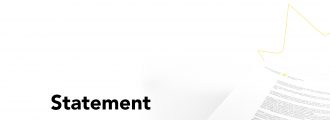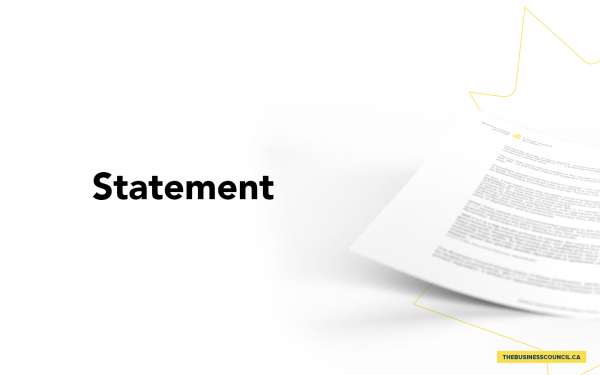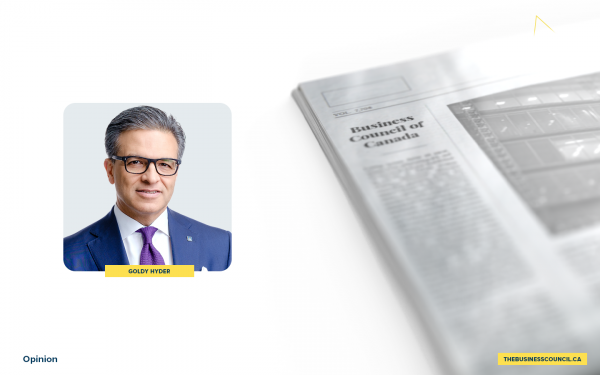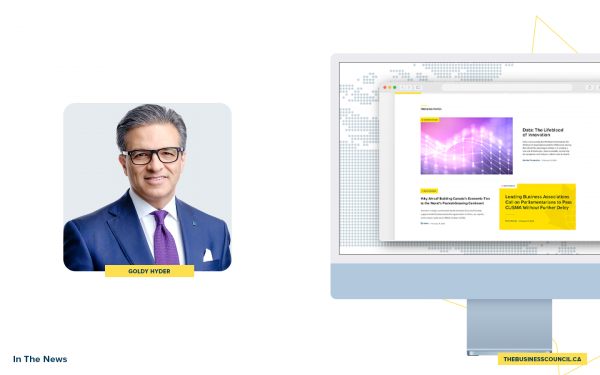Canadians will be a lot more digital post COVID
In light of the COVID-19 emergency, we’ve temporarily suspended our regularly scheduled series of conversations with Canadian CEOs. But we’re not going away. Instead, we’re going to pivot to the health emergency itself. We’re going to explore the impact on companies and workers across the country. And we’re going to find out how business leaders are responding to crisis.
“Canadians will be a lot more digital post COVID.” Stacey Madge, Country Manager and President of VISA Canada, offers insight into how the pandemic is changing consumer behavior, what that will mean in the future, and how VISA is helping small businesses through the crisis.
Latest Podcasts
Transcript
Goldy Hyder:
Welcome to Speaking of Business. I’m Goldy Hyder of the Business Council of Canada. The COVID-19 pandemic has changed many aspects of the way we live. Over the past few months, we’ve learned to keep our distance from others, many of us are adapting to working from home and our shopping patterns have also changed. We’re purchasing more online and when we go to the store, chances are, very little physical money is changing hands. Could we be heading towards a cashless society? What would that look like and how else are businesses being affected by the pandemic? Is the virus accelerating a digital transformation? Let’s find out.
Goldy Hyder:
My guest today is Stacey Madge, Country Manager and President of Visa Canada. Welcome to the podcast, Stacey.
Stacey Madge:
Thank you, Goldy. Pleasure to be here.
Goldy Hyder:
Well, first of all, how are you doing? How’s your family?
Stacey Madge:
Good. You know, I think the Chinese symbol for crisis is a combination of two symbols: danger and opportunity. While the danger to the economy and our health is real, I think it’s also a good opportunity for spending more time with family and having an opportunity to work with people at work that you wouldn’t necessarily have the opportunity to work with.
Goldy Hyder:
Well, if your house is anything like mine, where I’ve got three daughters, this virus and this pandemic has not stopped their desire to keep shopping. What are you seeing with your customers?
Stacey Madge:
So with Visa, and in Canada in general, 74 per cent of the $1 trillion in personal consumer expenditure is on card payments, whether it’s credit or debit cards and Visa is the largest payments network in Canada, based on dollar volumes. So we have a pretty good lens into spend behaviors and the sectors of the economy that are most impacted. So overall, payment volumes are down about 20 to 35 per cent, depending on the week. The hardest hit segments are, not surprisingly, in travel. So airlines, cruises and travel agencies, for example, have experienced declines of close to 95 per cent, so there’s incredible strain on these industries. Restaurants are down 75 per cent and despite the fact that growth of over 200 per cent in online ordering and delivery is taking place, it’s not enough to make up for what is, in fact, an in-person business.
Stacey Madge:
Then Canadian small businesses, as you know, are being fairly significantly impacted. Even before the crisis, the Canadian small businesses were not as digital as they needed to be. Only about 12 per cent of their sales was really from e-commerce and in Canada, we’ve seen an over 50 per cent decline in in-person sales, so small businesses are really disproportionately bearing a fair brunt of this.
Goldy Hyder:
Are you seeing the other side of that coin, as you mentioned? Other people who have come up from when they were perhaps down before the virus?
Stacey Madge:
Sure. And you know, Canada, as a country, our payment system is very digitally advanced. We rank as one of the top cashless countries in the world. Our payment system is very digitally sophisticated and so, if there was a country that was ready for government restrictions to stay at home, we were actually a country that was more ready than others, which is a positive thing. So grocery and food is up over 30 per cent. At the peak, when people were really hoarding, it was up over 80 per cent. Liquor and beer, unsurprisingly, is up around 30 per cent. A fun fact: cannabis is up about 150 per cent and then home entertainment. Things that are associated with making people’s lives more enjoyable at home are also up as well, as now we’re seeing real improvements in gardening and home improvements as people are trying to get outside and improve their home.
Goldy Hyder:
You’d be a great enabler for a lot of these smaller businesses, including those that perhaps have had a history of working from home to begin with. Is that the case?
Stacey Madge:
Yes, so we as Visa are doing a lot with respect to small business. It’s something that we’re pretty passionate about, so there’s a few things that we’re doing. We, as Visa globally, have launched a $210 million program. $10 million is aimed at the front lines as part of the crisis but $200 million is actually aimed at rebuilding small businesses and there’s going to be a focus predominantly on women’s economic advancement. Right now, we’re just working with the foundation on the specific strategy for Canada, which we’ll share in the coming weeks, as we want to make sure it’s very locally relevant.
Stacey Madge:
But in addition to that, Visa’s building a strong small business program just for Canadian small businesses with tools, partnerships and offers. We’re going to be directing a fair bit of our marketing efforts to help small businesses and getting them up and running. The advantage of being a global country is we’ve had the opportunity to learn from crisis and disasters in other parts of the world, such as the Australian wildfires, for example, and how we worked in Australia to restart small businesses there. We can bring a lot of those learnings to Canada.
Goldy Hyder:
Now, speaking of caring, I know we talked about your $210 million program, but I also know that you’ve been doing things in particular around food banks. Tell us a little bit about that.
Stacey Madge:
Yes, so we donated $10 million. $200 million is going to support small businesses and restarting the economy. $10 million is going to the front line and in Canada, as well as in the U.S., the organization that we’re supporting is Food Banks of Canada and so we’re very excited about that. We also have a lot of work with our employees that we’re doing. We’ve more than doubled the amount of time that employees can spend doing volunteer activities to support the crisis and we’ve got a number of food drives going on in the office to support Canada.
Goldy Hyder:
Well, that’s terrific. What other steps has Visa taken, in terms of making life easier for your customer during this crisis?
Stacey Madge:
So we’ve worked hard to ensure the safety and soundness of the Canadian and global payments ecosystem more broadly. In Canada, one thing we did is knowing that consumers were nervous, with respect to touching PIN pads at merchants, and cash has been associated with “It’s dirty.” It can change hands three to four times a day, and it’s seen as germ-carrying. We increased the tap to pay limits from $100 to $250 and merchants, banks and acquirers were really quick in Canada to make this happen. So today, we now have over 70 per cent of transactions that are occurring in person are either tap with your phone or tap with your card. This compares to just over 60 per cent pre-COVID.
Goldy Hyder:
So will those increased limits be available after the pandemic is over?
Stacey Madge:
Yes. The fraud associated with transactions either from $150 to $200 or above $200 is very, very low, so I see the convenience for consumers trumping what we’re seeing in terms of risks, so we don’t see that changing.
Goldy Hyder:
Right. Well, look, you were talking earlier about sort of some of the Canadian traits that you’ve observed, you being an early adopter of technology as a people, the notion that we were built to stay home, although I suspect we were also the opposite, in terms of the nature that we have to enjoy. What else have you learned about Canada and Canadians in this process?
Stacey Madge:
Well, I think what we’ll see as we come out of the crisis is there will be some fairly significant structural changes coming out of this. So in Canada, and in other parts of the world, we’ll see a further acceleration in the shift to cashless. So Canada is already a very cashless society and this, we would project, has just accelerated that, acceleration to cashless, by as much as three to five years. Canadians will be a lot more digital post-COVID than they were pre-COVID. We’ve seen a marked shift in Canadians shopping online during the crisis and online purchases are likely to remain at elevated levels.
Stacey Madge:
So if you look at pre-COVID, for example, that 50 per cent of our purchases were not face-to-face, were online or through e-commerce. Today, this is now north of 60 per cent. Online food delivery services are up 200 per cent. One-quarter of food and grocery purchases are now done online or through click to collect. And this digital consumer shift will not revert to the way it was pre-COVID and it will really necessitate small businesses accelerating their digital presence, so that will be a major structural change we’ll see.
Goldy Hyder:
Right. I referenced that, because I think the longer this thing lasts, the harder it is to change your behaviour afterwards. Even if you wanted to go back, after a year or two, you probably have beaten it out of your system, right?
Stacey Madge:
Exactly.
Goldy Hyder:
Well, the other interesting thing about talking with people like you in your position, Stacey, of course, is you have a global lens, right? I mean, Visa is a global company. You have line of sight to your colleagues around the world. What can you tell us, in terms of how your colleagues are responding? What are some of the best practices that you’ve been able to adopt or they’ve been able to take from us, for example?
Stacey Madge:
Well, a few things that we’ve seen across the world, Goldy. One is, Singapore’s a really good lesson for the world in not rushing too fast to open up business. What we saw in Singapore is, we reached a new floor after they opened up too quickly and then had to tighten the restrictions further. So that was one learning. Another learning is the importance of a digital payments ecosystem. So if you look at other economies around the world that don’t quite have that sophisticated of an ecosystem, they have really suffered, such as Italy, Brazil, India, where consumers just were not able to adapt to an online world. Then as we look at coming out of the crisis, we’ve learned a lot from economies such as South Korea, Taiwan, Germany, with respect to testing and tracing as a means to help accelerate the growth of the economy coming out of the crisis.
Goldy Hyder:
Let’s talk about leadership, because again, you’re a leader yourself. You have line of sight to a lot of leaders around the world. What are you learning about being a leader in a crisis and what have you learned about yourself?
Stacey Madge:
Well, being in a crisis, I found that it’s really important to have increased rigour and inclusiveness in decision-making. So when you’re working in a virtual environment, it’s more important than ever before to make sure you’re listening to your people, their views of major decisions, because you’re not able to rely as much as you can on visual cues in the meeting. So you really have to work harder at asking questions and listening to people and getting the different views. I think the second imperative that we found and that’s really, really important to us is around mental health and I know that’s a passion area of yours as well. People are under a lot of strain right now and what we did in Canada was, we built a very robust mental health program that’s focused on over-communicating, mindfulness and health exercises, learning seminars. We try to start every conversation with our people, with a question around “How are you feeling? How are you doing?” to make sure that we’re just caring for them.
Goldy Hyder:
Well, Stacey, time flies. Thank you for doing this. We’ve covered a lot of ground. I think you have shared with our listeners a lot of wisdom and a lot of nuggets about human behaviour and who we are as a people. And if there’s one thing I believe strongly in, it’s don’t underestimate mankind. We’re a pretty resilient lot. We’ll get through this, right?
Stacey Madge:
Absolutely.
Goldy Hyder:
Thanks again for doing this, Stacey. Stacey Madge is the Country Manager and President of Visa Canada. If you would like to hear more of our Speaking of Business conversations about the COVID-19 crisis, you can find them all wherever you get your podcasts. Or go to our website, SpeakingOfBiz.ca, that’s biz with a zed. Until next time, I’m Goldy Hyder. Thank you for joining us. Be well, be safe.









